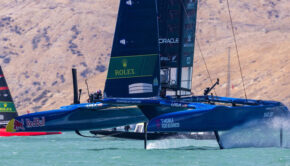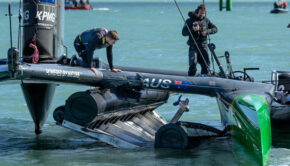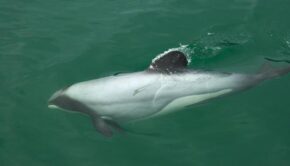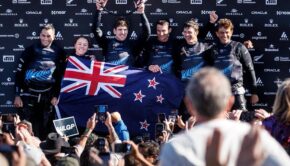Mixing entertainment and activism
Published on February 22nd, 2022
The mix of entertainment and activism is not without risk. It is just as easy to promote a cause as it is to alienate an audience. In this report by Kai Yves, she is now questioning her introduction to sailing:
I respect and admire Sir Russell Coutts a lot. Or, I used to. At the moment, my emotions towards him are very heavily mixed.
I became a sailing fan in the winter of 2015-16, after reading Derek Lundy’s magnificent account of the 1996 Vendée Globe, Godforsaken Sea. I had seen a few interviews with Ellen MacArthur in National Geographic Adventure as a kid, but I had never really known what the VG was or that solo sailing was a sport.
However, I became hooked and read everything I could find about the Vendée and offshore sailing.
Towards the end of the spring 2016 university term, I noticed a large photo-poster on the side of a sporting goods store near my university’s campus that showed a very unusual black catamaran. It didn’t look much like the IMOCAs I had been reading about, but I could tell it was about sport-sailing and I was intrigued enough to head inside.
The store turned out to be hosting a special event with SoftBank Team Japan ahead of the America’s Cup World Series New York in May 2016. I watched their presentation and entered a raffle to win a ride onboard their AC50, but didn’t win. Nonetheless, I knew I wanted to attend and asked for directions to the race village from one of the presenters (in retrospect, it might have been skipper Dean Barker!)
I rode the subway down to North Cove Marina on all three event days to watch the practicing and racing. Although I knew very little about the America’s Cup, I had a great time watching throughout the rainy first two days.
On the final day, the sun finally came out, and as I stood there in the brightness watching the prize giving as “Dancing on Glass” blared from the speakers, I felt bewitched in the truly magical sense. I knew I wanted to do this again.
I downloaded the app and followed the rest of the America’s Cup World Series, even when on an archaeological excavation in Greece. During the following spring, I read Julian Guthrie’s “The Billionaire and the Mechanic” to catch myself up on the immediate prior history of the America’s Cup, and by the time the main event kicked off in Bermuda, I was watching the racing every day on the app.
Although my beloved Team Japan did not make the final, I still went to the North Sails New York watch party and was spellbound as Team New Zealand flew to victory. Amazing! Fantastic! Incredible!
I followed Peter Burling and Blair Tuke into the 2017-18 Volvo Ocean Race that fall, watching the daily updates and chatting with other fans on social media. I was lucky enough to attend the Newport stopover with my mother, where I loved the energy of watching live, hanging out with other fans, learning about local environmental organizations working with the VOR, and meeting the sailors in person. I was a superfan!
That fall, I started hearing the whispers of a new catamaran-racing league based on the AC50s and became very excited. I can proudly say I was a SailGP fan from Day Negative Thirty or so— from the first rumor.
I tuned in at midnight on Valentine’s Day 2019 to see the first race kick off in Sydney, hurried back from the March for Science NYC to catch San Francisco, and came back to North Cove Marina to be there in person for SailGP New York.
During this time, I learned a bit of the story of the league’s CEO, Russell Coutts, and I found it to be a fascinating tale of ups and downs in the America’s Cup and the court of public opinion.
As an anthropology student, I found myself drawn, like several other social science researchers before me, to the case study of his changing reputation in New Zealand during his time with Team New Zealand, Alinghi, and Oracle, and what it revealed about nationalism and sports fandom in a larger societal context.
The impression that emerged, from the studies and the articles I could find, was of an ordinary professional unjustly vilified by nationalists. But with his Cincinnatus-like retirement from the America’s Cup to run a small sailing club near Auckland and then the debut of SailGP, it looked like Coutts’ reputation in his home country was finally mellowing out.
When I attended SailGP New York in 2019, I was lucky enough to meet with Mr. Coutts on both days. The first time, I was a bit star-struck and could only manage to mumble “You’re famous!”, but on the final day, we had a nice conversation outside of the Adrenaline Lounge.
I was able to express my thanks for both the ACWS and SailGP NYC, and to say that I wasn’t sure I would have become a fan without his popularization initiatives. Coutts responded graciously that he was glad to hear it, took off his baseball cap, signed it, and gave it to me, saying “I hope I see you here next year!”
That moment, after an already-amazing day of watching the racing, getting my homemade sign autographed by members of each team, and being able to tell Team Japan Kazuhiro Sofuku how much I appreciated his efforts to bring high-performance sailing back to Japan first with SBTJ and now SailGP Japan. Incredible! As I said on my blog at the time:
“HolyCrudHolyCrud I met the members of Team Japan and Russell Coutts… holy crud, they came so close to the breakwater… this whole weekend, really, just… HolyCrudGreatestDaysOfMyLife…”
Sadly, that reunion in New York was not to be. After the spectacular season finale in Marseilles, SailGP 2020 was destined to be cancelled after the opening event in Sydney. Although I was disappointed at the time, I respected the grace and prudence with which Mr. Coutts announced the suspension of the season until the coronavirus crisis was under control.
Still, I kept myself entertained during the lockdown by watching race replays, writing a few song parodies that were published on Scuttlebutt, and reading Coutts’ memoir “Course to Victory”.
2021 really did feel like a brand new year. I watched the America’s Cup livestreams from Auckland and envied the safety the people of New Zealand enjoyed as a result of their government’s careful and thorough coronavirus policy.
Freshly vaccinated and accepted to a new job in Washington DC, I welcomed back SailGP with my family by watching the Bermuda livestreams while eating Bermudian banana meatloaf and onion soup.
Throughout the summer and fall of 2021, I kept up with the racing as I worked in my new job and sailed with a club on the Potomac River, appreciating SailGP’s consistency and predictability while the America’s Cup seemed mired in controversy and uncertainty, as always.
When the planned Christchurch event was canceled, I was disappointed— but not as unhappy as I was when I saw Coutts’ response was to rant about the New Zealand government being “dictatorial” on Facebook. This seemed incredibly unprofessional and tone-deaf, especially as I had just visited the “In America” art exhibit in which 600,000 white flags were placed on the National Mall in memory of Americans lost to coronavirus.
Less than a hundred New Zealanders were dead, they had hosted the America’s Cup in such comfort and safety, and he wished his government’s response had been more like the one that had led to 600,000 deaths? Although I respected Mr. Coutts, I thought this was inappropriate and wrote to Scuttlebutt at the time to say so.
Thankfully, as SailGP Sydney approached, that controversy seemed to fall by the wayside. The only statements Coutts seemed to be making were related to the league itself, and as the omicron variant’s effects became visible even in New Zealand, his prior inappropriate comments seemed destined to become an embarrassing but minor footnote.
I was happy to let them be forgotten as I watched SailGP Sydney, chatted with other fans online, and headed home for a holiday season of telescope launches, Christmas, and the return of the Sydney-Hobart Race.
When the SailGP Season 3 schedule was announced for 2022-23, I got to work on planning a trip to Chicago, and settled in to wait for the March 2022 Season 2 finale in San Francisco. And that’s about where things stood, in pleasant anticipation, until February 17.
The New Zealand media reported that Coutts had posted on Facebook again, doubling down on his accusations that the government’s coronavirus response was “dictatorship” and a threat to citizens’ “freedoms”— never mind that New Zealand had just been judged the second-freest nation on Earth (and quite a bit above the United States).
He expressed his intent to join protesters occupying the grounds of Parliament in Wellington who also opposed these public health policies. This cheery bunch, copycatting a similarly lovely gang of Canadians, had already been in the news for such delightful antics as defecating on war memorials, calling for the arrest and execution of the Prime Minister, and harassing students and business owners in Wellington.
Meanwhile, 75% of their fellow New Zealand citizens said the government’s policies were either acceptable or not strict enough and almost 95% have been fully vaccinated.
In the days since, the situation in Wellington has steadily deteriorated, with the protestors throwing fireworks and human feces at the police. But Coutts did not apologize for or retract his prior statements in any way. Instead, he visited the protest camp unmasked and reiterated his support for the protestors and their goals in an online interview.
Later in the day, the protestors escalated to throwing acid at police and attempting to ram them with a car, but despite these outright criminal and terroristic acts, there has still been nothing like an apology or retraction from Coutts.
Mr. Coutts has made much of making sailing appealing to young people and offering them opportunities through the Youth America’s Cup, through his own work at Manly Sailing Club, and through SailGP’s Inspire program.
But now he has sided with people who have used children as human shields against the police, thrown raw eggs and garbage at teenagers for wearing masks, and spat on and threatened to stab university students.
In 2020, Mr. Coutts posted on social media in support of the Black Lives Matter movement and the official SailGP account posted a message that stated “SailGP stands squarely behind efforts to combat social injustice and racism, which have no place in any society”.
Later that year, when the league announcement he #RaceForTheFuture program to increase diversity and inclusion in the sport of sailing, Coutts said he wanted SailGP to be seen as “champions of inclusivity”.
But the statements about “race” in Coutts’ Facebook posts have been interpreted as anti-Maori, and in joining the protest, he has aligned himself with people who give Nazi salutes, draw swastikas, and have called for the release of the murderer behind the infamous mosque shooting.
What are we to make of a man who says his league holds sustainability as a core value and partnered with Dr. Enric Sala of National Geographic’s Pristine Seas Initiative when he is befriending people who have illegally dumped chemical toilet waste into Wellington’s sewers and rendered beaches “unswimmable” with this pollution?
These occupiers are a reactionary force, clearly opposed to the values of science, sustainability, and diversity that SailGP’s #RaceForTheFuture embodies. Yet Coutts said he supported their actions in the name of “future generations”.
Mr. Coutts has spent the past decade and a half saying his mission is to combat the “stodgy” image of sailing. He has railed against “white trousers and blue blazers”, champagne and lobster on the foredeck, and other pop-cultural images of sailing as a antiquated, conservative sport for the traditional privileged elites.
And to his credit, he has promoted individuals who do not fit the stereotype of the rich, old, white, male yachtsman as the sailors and athletes they are.
SailGP viewers can see that the face of pro sailing in the 21st century can be a boy who grew up disabled and too poor to afford the adaptive shoes he needed like Jimmy Spithill, a young Latina superathlete from Hawaii like CJ Perez, or a Kiwi of Japanese descent like Leo Takahashi, using bleeding-edge science and technology to create a better world.
But the image we have seen in the past week in the media is that *yachting*— and “yachting”, “yacht”, and “yachtsman” are the words we see most commonly used here— looks like a 60-year-old white multi-millionaire who lives in a mansion and rejects medical “experts” to align himself with conspiracy theorists who think vaccines contain nanobots and turn blood black.
Is this what the SailGP league and the sport of sailing as a whole want to be associated with?
In the Racing Rules of Sailing, Rule 69 defines misconduct as “conduct that may bring, or has brought, the sport into disrepute.” With his repeated identification in the press as a former Olympic and America’s Cup sailor, it certainly seems that a measure of disrepute is being brought upon the sport of sailing by Mr. Coutts’ conduct in Wellington.
Over the past two years, Scuttlebutt, US Sailing, and many other sailing organizations around the world have been engaging, as in society at large, in the hard and necessary work of studying our past, our privileges, and our demographics.
We have been having hard but necessary conversations about gender, racial, and LGBT+ inclusion in our sport, and about its environmental costs.
For a time, it seemed like Russell Coutts was acting admirably as a participant in these conversations. Now he has become the subject of such reckoning, and we are forced to re-examine his prior actions in this light.
In October, when the Impact League was announced, Mr. Coutts said, “We believe in the power of sport for good and that sport has a responsibility to lead by example to inspire others to make simple changes for a better planet.” I also believe in SailGP’s potential as a powerful force for good.
But as I look through my photographs from that beautiful summer day at North Cove Marina, I can only ask myself— What does Russell Coutts REALLY believe in?
Editor’s note: This is a divisive topic, and Russell’s participation in the protest did receive significant support on his Facebook page.









 We’ll keep your information safe.
We’ll keep your information safe.